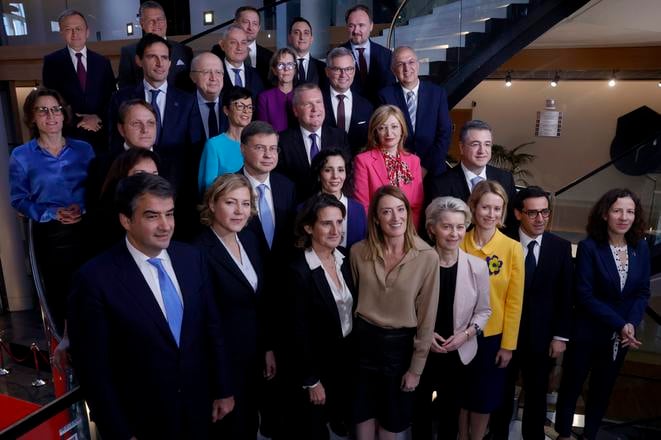The European Commission’s new term begins over the weekend, December 1, ushering in a leadership team tasked with steering the EU until October 2029. Among its ranks is Slovakia’s Maroš Šefčovič, a seasoned diplomat and long-serving commissioner, nominated by the ruling Smer party.
On November 27, the European Parliament narrowly approved the Commission, with the European Council—comprising leaders of EU member states—confirming its appointment the following day.
Slovakia’s MEPs cast particularly notable votes, especially those from Smer. This group includes long-serving MEP Monika Beňová, pro-Russian newcomer Ľuboš Blaha, conspiracy-linked Judita Laššáková, media critic Erik Kaliňák, and Katarína Roth Neveďalová. All five, alongside two far-right MEPs from the Republika party, voted against the Commission—effectively opposing Šefčovič’s appointment.
“We will vote AGAINST, as this is a continuation of policies that have utterly failed over the past five years,” Smer declared on Facebook on November 26.
Ivan Korčok, a former foreign minister, diplomat, and presidential candidate now allied with Progressive Slovakia, called Smer’s stance “one of the greatest political absurdities I have ever witnessed.”
Fico’s made-up claim
Šefčovič, the EU’s second-longest-serving commissioner, underwent his parliamentary hearing in early November. He described China as the EU’s “most challenging trade partner” and pledged to propose cooperation with the USA regardless of its presidential election results. Šefčovič passed the hearing smoothly and will oversee transparency, trade, economic security, and interinstitutional affairs.
Smer leader Robert Fico repeatedly acknowledged Šefčovič’s expertise in the past months.
Curiously, weeks before the hearing, Fico alleged that Progressive Slovakia, the largest opposition party in Slovakia, and its MEPs were plotting to derail Šefčovič’s nomination. “Stop working to make Maroš Šefčovič’s life hell in November in the European Parliament. That’s all they’re doing,” Fico claimed in Brussels in mid-October. Progressive Slovakia dismissed his accusations, stating that Fico often blames external enemies when facing issues abroad.
Ironically, the Commission received support from Slovak MEPs representing Progressive Slovakia, Hlas, and KDH.
“After weeks of lying about supposed opposition plots against Šefčovič, they ultimately stabbed him in the back themselves, weakening his position and damaging Slovakia’s interests,” Progressive Slovakia MEP Ľubica Karvašová said.
Against the Commission, for Šefčovič
Monika Beňová, however, clarified that Smer MEPs’ votes were not a personal rejection of Šefčovič. Instead, she said, they opposed other nominees deemed problematic, including new EU foreign minister and former Estonian prime minister Kaja Kallas. President Peter Pellegrini, Fico’s ally, criticised Kallas this summer for having a “narrow worldview.”
In the summer, Smer MEPs had also vowed to oppose Ursula von der Leyen’s reappointment, citing issues like vaccine procurement contracts and her promise of EU membership to Ukraine without prior European Council approval.
Nevertheless, Beňová expressed her support for Šefčovič on social media, saying, “We wish Maroš Šefčovič the very best.”


 European Commission President Ursula von der Leyen, front centre right, and European Parliament President Roberta Metsola, front centre left, pose with the new EU College of Commissioners, after a vote at the European Parliament in Strasbourg, France, Wednesday, November 27, 2024. (source: Jean-Francois Badias)
European Commission President Ursula von der Leyen, front centre right, and European Parliament President Roberta Metsola, front centre left, pose with the new EU College of Commissioners, after a vote at the European Parliament in Strasbourg, France, Wednesday, November 27, 2024. (source: Jean-Francois Badias)
